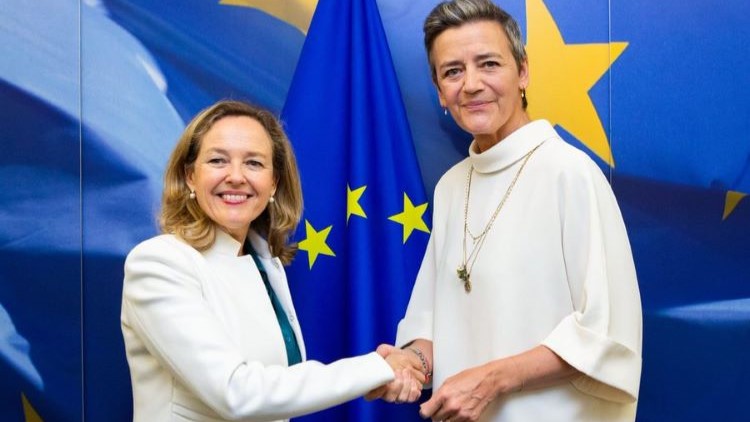The Diplomat
The first vice president and acting Minister of Economic Affairs and Digital Transformation, Nadia Calviño, will try to become a prophet in her own land and secure, during the next informal meeting of the Council of Economic and Finance Ministers (Ecofin) in Santiago de Compostela, her appointment as president of the European Investment Bank (EIB), where she will compete with the so far vice president and European Commissioner for Competition, the Danish Margrethe Vestager.
The European Investment Bank (EIB), founded in 1958 after the entry into force of the Treaty of Rome that established the European Economic Community (EEC), is the main financial arm of the EU and one of the largest development institutions in the world. Whether Calviño or Vestager (the two main candidates) wins, she would be the first woman to head the institution since its foundation 65 years ago.
Spain has taken advantage of its rotating presidency of the EU Council to introduce the debate and vote for the EIB presidency during the Ecofin meeting, which will take place on the 15th and 16th of this month in the capital of Galicia, the same autonomous community where Nadia Calviño is from. The Spanish Vice President in office and the liberal Margrethe Vestager will opt for the position along with three other candidates, the Polish and EIB Vice President Teresa Czerwinska, the former Italian Minister Daniele Franco and the Swedish and also EIB Vice President Thomas Östros.
Last Wednesday, Caviño expressed in Brussels her “strong motivation” to chair the EIB and declared that “Spain has presented a strong candidacy to try to have, for the first time, a Spanish person and a woman at the head of the EIB”. For her part, Vestager recently requested a temporary leave of absence from the European Commission to focus on her candidacy, pending a decision. For Calviño, this candidacy is particularly relevant after her failed attempts to head the International Monetary Fund (IMF) following Christine Lagarde’s departure to the European Central Bank (ECB) and to chair the Eurogroup, formed by the economic ministers of the Eurozone.
The EIB presidency requires the support of 68% of the bank’s capital and at least 18 member states. Since the participation of each Member State depends on its economic weight in the EU in terms of GDP, it is essential to have the support of the three great economic powers of Europe and main shareholders of the bank, based in Luxembourg: Germany, France and Italy. Spain has 11% of the shareholding and these three countries hold 19% each. The sum of the four countries would therefore ensure the necessary 68%, regardless of the vote of the rest.
As reported last Friday by the news portal Economía Digital, Nadia Calviño has already secured the support of the EIB’s major shareholders, Germany, Italy and France, so everything suggests that she will finally triumph in her bid for the presidency of the EIB. Specifically, Spain would have obtained the support of Germany in exchange for sacrificing the appointment of Margarita Delgado, deputy governor of the Bank of Spain, as supervisor of the ECB in favor of the German Claudia Buch. Likewise, he would have obtained the favor of France after the agreement between both countries to increase energy relations and would have obtained the backing of Italy in exchange for supporting the aforementioned Daniele Franco for the vice-presidency of the European Central Bank, where he would coincide with Luis de Guindos.
In any case, both the debate and the vote in Santiago de Compostela are part of the current process of negotiations and informal consultations that will conclude with the official appointment of the person to succeed the German Werner Hoyer, whose term of office expires at the end of this year. The final decision will actually rest with the EIB’s Board of Governors, which is made up of the same EU finance ministers and is likely to make its decision in October. The new president will take office on January 1, 2024.







